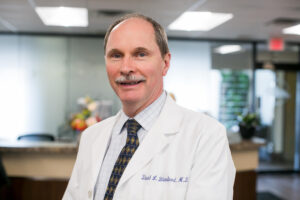Posted by: Kentucky Eye Institute in General Eye Health
An ophthalmologist is a medical doctor or a doctor of osteopathic medicine who specializes in eye and vision care. Like optometrists, ophthalmologists can perform eye examinations and write prescriptions for eyeglasses and contacts. Additionally, ophthalmologists are licensed to diagnose and treat disease as well as perform eye surgery. Ophthalmologists are specially trained to treat medical problems that require extra medical care or even ocular surgery, such as glaucoma, macular degeneration, and cataracts.
At Kentucky Eye Institute we have many great ophthalmologists on staff, and this month we sat down with Dr. David Blandford, MD, to learn more about the average work day for an ophthalmologist. Born and raised in Kentucky, Dr. Blandford graduated from the University of Kentucky College of Pharmacy in 1981. He received his M.D. degree with distinction from the University of Kentucky College of Medicine in 1989 and completed his Ophthalmic Residency at the University of Kentucky in 1994. He has participated in over 25 medical papers and abstracts and has also co-produced a medication delivery system for eye medications, which has been patented. Dr. Blandford has a long, distinguished career in the field of ophthalmology, and has a special interest in cataract/implant surgery as well as refractive surgery. Dr. Blandford gives us an inside look into his life as an ophthalmologist.
Q: What was it that led you into ophthalmology? How long have you been in the field?
A: I went into ophthalmology because 2 of my kids had tear drainage obstruction. While in the ophthalmologist’s clinic, I found that the doctors were the happiest ones I’d seen. It led me to pursue that career track in medicine and I have been doing this for over 25 years.
Q: What does a typical day/week look like?
A: My typical work week is a mix of one on one patient care in the clinic and surgical care. This mix is one of the things that keeps ophthalmic practice interesting and challenging for me.
Q: What is the most exciting/rewarding part of your job?
A: The most rewarding part of ophthalmology is restoring the sight of people with visual impairments.
Q: What tips do you have for patients when it comes to caring for their eyes?
A: Don’t sleep in contact lenses. Use sunglasses to protect your eyes from excess sunlight. Don’t overuse “get the red out” drops; they can cause problems if overused.
Q: How do you spend your time outside of the Kentucky Eye Institute?
A: Outside interests include traveling to experience different cultures and culinary arts, gardening (in season) and spending time with friends and family.
Caring for your eyes doesn’t have to be hard, and by following the tips from Dr. Blandford you can help ensure that your eyes stay healthier, longer.
- Don’t sleep in contact lenses: When you fall asleep with your contacts in, a lack of oxygen will cause your cornea to swell, creating an opening for bacteria to enter the eye. This bacteria increases the chance of an eye infection which, if left untreated, can cause serious complications to your vision.
- Use sunglasses to protect from sunlight: Just like your skin, your eyes need to be protected from the sun’s UV rays. Excessive exposure to the sun can cause issues such as cataracts (⅕ of all cases result from UV exposure), macular degeneration (the leading cause of blindness in the US), and Pterygium (tissue growth over the eye that can cause astigmatism).
- Don’t overuse “get the red out” drops: Using these eyedrops in moderation is completely safe, but excessive use can actually cause dry, red eyes to get worse. Naphazoline, an active ingredient in many of these drops, both prescription and over the counter, can cause dizziness, headache, nausea, sweating, and a decreased heart rate.

If you have any questions or concerns about keeping your eyes healthy, give us a call to schedule an appointment with Dr. Blandford or one of our other great doctors. Our optometrists and ophthalmologists are located in Lexington, Corbin, Cynthiana, Jackson, Maysville, Middlesboro, Morehead, Mt. Sterling, Paintsville, and Versailles.
